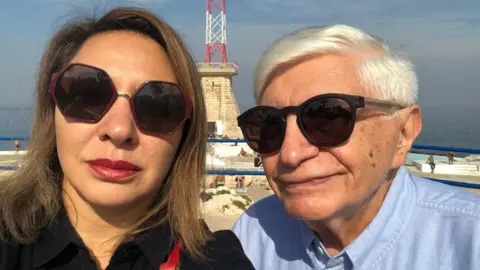British nationals tell of ‘surreal’ Lebanon evacuation

 Supplied
Supplied
A British woman who was among more than 150 people to be evacuated from Lebanon has described her anguish at leaving her life in the Middle Eastern country behind.
Isobel Taper told the BBC: “My life is out there, so it feels strange being back here.”
The 31-year-old arrived in Birmingham on Wednesday on board the first flight chartered by the UK government, after it urged UK nationals to leave immediately amid escalating conflict between Israel and Hezbollah.
Even though she is now staying with her parents in Ealing, west London, Ms Taper said she feels guilty for leaving her boyfriend and cats in Lebanon.
“Everything just feels very surreal,” she said.
Since Wednesday’s flight, the UK government has said it will charter a “limited” number of flights from Beirut to evacuate “hundreds” of British nationals and their dependents.
The Foreign Office said the flights would continue “as long as the security situation allows”, with more departing on Thursday.
Ms Taper was studying for a master’s degree in Beirut, having moved to Lebanon in July last year.
She said she decided to leave when the conflict spread to the part of the city where she was staying.
“They hit downtown Beirut and I think now it’s got to the point where there’s nowhere safe, so I decided to leave. I’m really, really hoping I can go back.”
Ms Taper added: “My parents have been so worried. I wanted to come back and give them some peace of mind.”
She said the evacuation felt “rushed” and that she received an email confirming her seat on the evacuation flight around four hours before it took off.
Although her boyfriend used to live in London and his grandfather is British, Ms Taper said, “it’s his home he wants to stay there”.

 Supplied
Supplied
Dia, 81, and Amine, 88, are dual British-Lebanese nationals, but moved back to Beirut from London when they retired in 2000.
Their daughter, Mona Deeley, was able to secure a space for Dia on the flight, but told the BBC of her “hard” decision to leave Amine – who needs 24-hour care – behind.
“A normal trip is gruelling at their age, let alone an evacuation,” she said.
Elderly people have to think about “not only whether a bomb is going to fall on your heads or not” but also “not having access to your medication, to your doctor, to your hospital”, Ms Deeley added.
“With my mum, it felt like now or never.
“She can’t change anything for him on the ground, she can’t lift him up and nurse him herself – so in a very hard way, it was more reassuring for us to have one of them here.”

 Supplied
Supplied
Both Ms Taper and Ms Deeley say their families have been affected by the escalating conflict in Lebanon.
Ms Deeley said her parents were anxiously waiting to hear whether her grandparents’ grave in the Bashoura Muslim cemetery in central Beirut had been damaged in an air strike on Wednesday.
Isobel said her boyfriend’s work as a musician has “completely disappeared” and she worries about other people who now find themselves without work.
“It’s one of the forgotten things that we don’t think about in war, how it affects so many industries. It affects so many aspects of people’s lives. I just constantly think: ‘It’s not going to get too bad,’ then every day it does get worse.”
As of last week, there were thought to be between 4,000 and 6,000 UK nationals, including dependants, in Lebanon.
Some have been able to leave on commercial flights – but said empty seats were hard to find.
The Foreign Office said it was working to increase capacity on commercial flights for British nationals, and that around 700 troops and government staff had been deployed to Cyprus for “contingency planning”.
Israel has stepped up its aerial assault of Beirut in the past week, targeting densely populated areas that it says are home to Hezbollah leaders and military equipment.
On Tuesday, Israeli ground forces entered southern Lebanon in what it described as a “limited and targeted” incursion.
Iran later launched a barrage of missiles toward Israel, exacerbating fears of a growing regional conflict.








